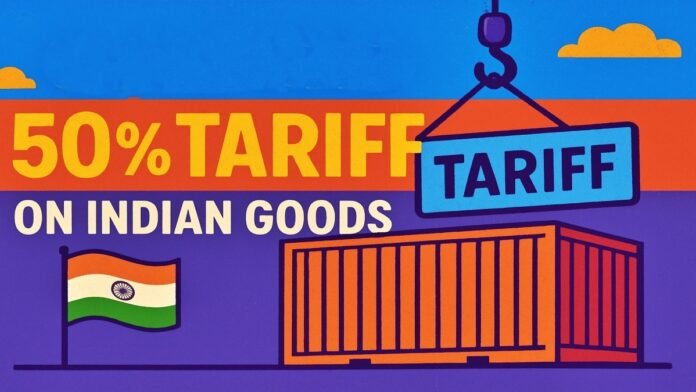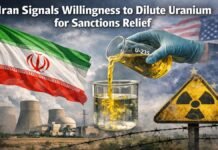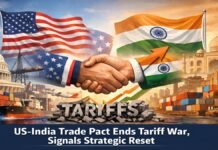
Key Points:
- First bilateral trade talks since 50% tariff imposition as US chief negotiator Brendan Lynch arrives in New Delhi on Monday night
- Trump administration shows positive shift with Peter Navarro acknowledging “India is coming to the table”
- Original August 25-29 sixth round postponed due to 25% punitive tariffs plus 25% reciprocal tariffs totaling 50%
- India’s exports to US declined to $6.86 billion in August from $8.01 billion in July following tariff implementation
- October 2025 target remains for completing first tranche of Bilateral Trade Agreement despite recent setbacks
- Commerce Secretary confirms “positive frame of mind” in both countries regarding renewed trade negotiations
- PM Modi welcomes Trump’s conciliatory tone calling India-US relationship “very special” and emphasizing natural partnership
New Delhi: After weeks of escalating trade tensions, India and the United States are resuming high-level bilateral trade discussions in New Delhi today, marking the first face-to-face negotiations since President Donald Trump imposed punitive 50% tariffs on Indian goods in August. The talks represent a potential turning point in strained relations between the world’s two largest democracies.
US Chief Negotiator Arrives for Crucial Talks
Brendan Lynch, Assistant US Trade Representative for South and Central Asia, arrived in New Delhi on Monday night to lead the American delegation in what officials describe as exploratory discussions rather than formal sixth-round negotiations. Lynch, who previously served as USTR’s director for India and worked in the Office of Agricultural Affairs, brings extensive experience managing US-India trade relationships.
India’s chief negotiator Rajesh Agarwal, Special Secretary in the Commerce Ministry, confirmed that Tuesday’s talks will focus exclusively on trade-related issues while avoiding non-trade matters that contributed to recent tensions. The single-day meeting aims to determine the future course of bilateral trade negotiations and assess possibilities for reaching a comprehensive agreement.
Trump Administration’s Strategic Shift
The resumption of talks follows President Trump’s notable softening of rhetoric regarding India-US relations after weeks of criticism over New Delhi’s Russian oil purchases. Trump recently praised Prime Minister Modi as a “great Prime Minister” and emphasized their personal friendship, describing bilateral ties as a “very special relationship”.
White House Trade Advisor Peter Navarro, previously one of the most vocal critics of India’s trade policies, acknowledged in a television interview that “India is coming to the table,” signaling a significant shift in the administration’s approach. This change in tone has been warmly received by Prime Minister Modi, who expressed deep appreciation for Trump’s positive assessment of bilateral ties.
Tariff Tensions and Economic Impact
The trade talks were originally scheduled for August 25-29 but were postponed after Trump imposed a 25% punitive tariff on top of existing 25% reciprocal tariffs, creating a cumulative 50% levy on Indian goods. The additional tariff was specifically imposed as punishment for India’s continued purchases of Russian oil, with the measures taking effect on August 27.
India’s merchandise exports to the US fell significantly from $8.01 billion in July to $6.86 billion in August, reflecting the immediate impact of the tariff measures. Overall Indian goods exports dropped to a five-month low of $35.10 billion in August, demonstrating the broader economic consequences of the trade dispute.
Previous Negotiation Progress
Five rounds of negotiations for the India-US Bilateral Trade Agreement (BTA) have been completed, with both countries originally targeting completion of the first tranche by October-November 2025. The two nations finalized detailed terms of reference for BTA negotiations on March 29, with US Vice President JD Vance officially announcing the finalization during his April visit to India.
Commerce Secretary Sunil Barthwal confirmed that both sides have maintained engagement through virtual meetings on a weekly basis despite the suspension of in-person negotiations. However, officials acknowledged that progress remained limited due to an “unfavorable overall atmosphere” created by the tariff dispute.
Agricultural Sector Concerns
Indian negotiators have raised significant concerns about US demands to open agricultural and dairy sectors, which are considered sensitive areas providing livelihoods to a substantial portion of India’s population. These sectors represent particular challenges for India given their socio-economic importance and political sensitivity.
The agricultural negotiations reflect broader challenges in reaching a comprehensive trade agreement that balances economic liberalization with domestic policy priorities and food security concerns.
Diplomatic Momentum Building
Recent diplomatic exchanges suggest renewed momentum for resolving trade disputes. Commerce Secretary Howard Lutnick indicated last Thursday that the US believes trade issues can be resolved “once India stops buying Russian oil,” while Trump’s nominee for US Ambassador to India, Sergio Gor, told senators that the two countries are “not far apart” on trade matters.
Gor also mentioned during his Senate confirmation hearing that India’s trade minister has been invited to meet US Trade Representative Jamieson Greer in Washington, indicating potential for high-level ministerial engagement.
Strategic Partnership Beyond Trade
Prime Minister Modi emphasized the broader context of India-US relations, describing the countries as having a “very positive and forward-looking Comprehensive and Global Strategic Partnership” that extends beyond commercial ties. This comprehensive framework encompasses defense cooperation, technology transfer, and strategic coordination on global issues.
The renewed focus on trade negotiations occurs within this broader strategic partnership, suggesting that both countries recognize the importance of resolving commercial disputes to maintain overall bilateral cooperation.
Today’s discussions will be closely watched as a test of both countries’ commitment to finding mutually acceptable solutions that address American concerns about trade deficits while respecting India’s sovereign decision-making on energy purchases and agricultural policies.



















































